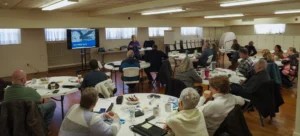This blogpost contains descriptions of drug and alcohol addiction and may not be suitable for everyone. Please use discretion.
“Many of us who suffer from addictive behaviors start out curious,” Peter Gilbreth told Good Dads in a recent phone interview. “We want to find out what something feels like—and as it turns out, it’s amazing.”
Gilbreth said the slide into addiction is slow at first. Maybe nothing bad happens the first time you try a drug. You use again and again, and still, there are no major negative repercussions. Then before you know it, you commit crimes, hide your use from others and adopt antisocial behaviors. All you can think about is your next high.
Gilbreth, a Kansas City native, now lives in Joplin, MO. The father of two has lived a life that might be described as a roller coaster. He spent many years of his life struggling with alcohol and drug dependency, feeling lost, confused and angry. Fast forward to today, and Gilbreth’s behaviors and habits are like night and day.
Good Dads spoke with Gilbreth to learn about his exceptional story, and we’re honored to showcase his successes in our final article on our October theme in recognition of Substance Abuse Prevention Month.
Let’s Start at the Very Beginning
Gilbreth calls himself a true thespian. In high school, he won the Best Actor superlative. He was in speech and debate and theater clubs. He always loved music. He was a state champion wrestler in his senior year. He was a very bright student, too. He said he had the highest ACT score in his school, though he didn’t apply himself. His first semester in college, he learned a lot about partying, making a C-grade average in his classes.
He remembers his parents telling him they weren’t going to financially support his education if it meant he was just going to sleep through classes, so Gilbreth dropped out for a time and enjoyed a carefree life playing guitar and singing for some local bands.
“I thought it was perfect, but I wasn’t getting anywhere with it,” he said.
By then, Gilbreth had already started a pattern of substance use. At 24 years old, he decided to go back to school. He was taking an EMT course and working at a hospital when he met the mother of his children. It was around that time that Gilbreth started to use drugs intravenously.
After living together for some time, it was clear to both of them that their relationship was not working out. But life has a way of throwing us curveballs, and she got pregnant after one last night together. Suddenly, he had a child on the way. Gilbreth described it as “heartbreaking” because he’d always imagined being able to grow old with the mother of his child.
“Here I was at 25, and that dream had just been shattered,” he said. “We knew we weren’t right for each other.”
Gilbreth loves his daughter so much, and he describes her birth as the most magical experience of his life.
“It was an amazing feeling,” he said. “I was on top of the world. I still get goosebumps thinking about the day Marisa was born.”
While he adored his daughter, he simultaneously developed resentments to Marisa’s mother. The couple tried living together for some time in Gilbreth’s parents’ home, but “long story short: It didn’t work out.”
Marisa’s mother moved out, taking Marisa with her.
“On the one hand, I didn’t want to be a father,” Gilbreth said. “But I also didn’t want to be without my daughter.”
He was angry—and perhaps his anger took him to where he found himself next.
Codewords and Vocabulary
Because there are so many words to describe addiction and recovery—and because the language we use to talk about ourselves is so important—Good Dads asked Gilbreth to speak on the words he uses to describe himself.
Addiction
A person who knows something is dangerous for them and continues to do it anyway has an addiction. Gilbreth specified that an addiction doesn’t necessarily have to be substance-related (like drugs and alcohol in Gilbreth’s case). Gambling and sex addiction are two examples. When someone is addicted, observable changes in their physiology become apparent. Their dopamine and serotonin levels are impacted; neuro-processors are affected. One’s brain chemistry is altered.
“It’s not just the way we feel—but the way we think about the way we feel,” Gilbreth said.
Recovery
When speaking about himself, Gilbreth uses words like “clean” and “sober” to describe his recovery, although preferred wording may differ for others.
“It’s a little like pronouns,” Gilbreth said. “It’s how you identify with your sobriety.”
“Cool”
When you meet someone new, you might ask your friend: “Is he cool?”
Gilbreth says that’s code for: “Can I trust this person to know that I participate in criminal activities, to know about my addiction? Are they going to rat me out to my parents or to the authorities?”
These kinds of questions are common in the minds of people who struggle with addiction, Gilbreth says, because addicted people have to be on high-alert at all times. They feel they must constantly seclude themselves from others, or avoid certain locations, to support their addiction.
It’s problematic, Gilbreth says, because addicted people are often untrusting, creating an us-versus-them echo-chamber.
Alcohol and Estrangement
“I had a really rocky 10–15 years where I didn’t think my dad liked me—and vise-versa,” Gilbreth said.
But after Marisa’s mother left and took Marisa with her, Gilbreth and his father started brewing beer together at their home. They got very good at it.
“I tasted it, and it was really good,” Gilbreth said. “My father and I finally grew close.”
When Gilbreth speaks about his alcohol dependency, you can practically hear him rolling his eyes at himself. He can look back and clearly see his unhealthy, unsustainable habits, but it’s not always possible to see one’s pattern of behaviors while in the thick of it.
“I always wanted to work somewhere where I could drink,” Gilbreth said.
Whether that was brewing at various pubs in the Kansas City area, bartending in Joplin or home-brewing with his father, he found ways to justify his drinking. But after two DWI’s in KC and a third in Joplin, it became obvious to him that he had a problem.
Gilbreth ended up having a second child with Marisa’s mother—a son named Zac. Resentments mounted. Gilbreth says at the time he thought she had seduced him on purpose, to punish him.
Between the ages of 30 and 35, Gilbreth was working at a call center doing corporate analysis. But he started drinking again, and he lost his job. Discouraged, he started using drugs again. This domino-effect meant Gilbreth later struggled to keep up with child support obligations. It was a very challenging part of his life.
After Zac was born and the mother of his children left him, she got her life back together, Gilbreth said. But he wasn’t ready to do the same.
She got back on track with her career and has been “a wonderful mother” to the kids.
“It sucked because I had massive resentments to her,” Gilbreth said. He felt used.
The custody and visitation orders were very strict, and his addiction caused additional estrangement.
“I wish I would have had somebody point out to me that I was thinking about it all wrong,” Gilbreth said. “Maybe I did, and I just didn’t listen.”
A New Beginning… at New Beginning Sanctuary
In 2018, Gilbreth found himself in a cell in Jasper County Jail. He had a decision to make: either serve time in prison or take advantage of a recovery program, which allowed offenders to get another shot to avoid prison sentences. He was not enthusiastic about either option.
“I had many plans about how I’d go about living my life outside of jail, and none of them had to do with … places with high levels of accountability,” he said.
By this time, Gilbreth had been dependent on alcohol and meth.
New Beginning Sanctuary was a foreign place. At first, he wasn’t sure he’d made the right decision. More than once he wondered if he should just go to prison instead. But after estranging himself from his loved ones in a very serious way, he knew his parents and children were counting on him.
After four or five months, Gilbreth recognized something starting to shift within himself.
He began to examine his own motives, concluding his actions were selfish. He began to pay closer attention to the set of 36 lessons/rules at the Sanctuary, intensely scrutinizing how each one could apply to him. What could he learn from it all if he applied himself to strictly adhere to each lesson?
“Then, it was amazing the change that came from my attitude,” he said. “I began to take pride in doing things correctly.”
It’s weird to think about having pride in making one’s bed every morning, for example, but Gilbreth said adherence to these lessons had a massive effect on his self-esteem.
“(I had been) asked to do something by my society, (and) it occurred to me that I need society,” he said.
Gilbreth could thank society for things like air conditioning, roads, the food supply chain—even Facebook! Previously he had been so anti-social, but then he thought: What would I do without society?
“There’s something collective about it,” Gilbreth said. “If I’m going to be true to who I am, I need to be accountable to my society because we’re all in this together. Why am I trying so hard to be apart from it instead of a part of it?
“I love my life today and have trouble looking back at the man I once was, sometimes feeling guilt and shame, but I also recognize that I wouldn’t be the man I am today without those experiences.”
Gilbreth says others look up to him now, and he feels a great sense of pride.
Making a Difference for Others
“Resentments robbed me of the joys of fatherhood,” Gilbreth said. “That’s what got me interested in Good Dads. I want to help other men see … their attitudes govern their experience.”
Now, Gilbreth is the Housing Manager for the Joplin region of New Beginning Sanctuary. He described becoming a mentor for men in the program as “healing,” even if he only has a short time with them. Because he can’t make up for lost time as a dad, he sees his work as a way to give back.
“Helping society as a whole is cyclical to helping myself,” he said.
He sees what he does as a means to use his experiences to the benefit of others. By helping men get connected, offering transportation help, managing outreach to correctional facilities in the state and encouraging them to enroll in the Good Dads program, Gilbreth says he’s helping men forgive themselves. He’s even helping men establish a home plan. It’s the very thing he hated the most when he was in their shoes but precisely what he needed most at the time.
“How can I take all this bad stuff I’ve done and been through, all these negative emotions—and package them up into warnings and advice for others?” he asks himself. Maybe then other guys won’t have to go through as much as he did.
Gilbreth calls his children “awesome people.”
Marisa lives in northwest Arkansas and works with families and children as a therapist. She got married earlier this month.
Zac travels for a living for an auto parts retailer. Gilbreth says Zac’s hoping to get a promotion soon.
Gilbreth went back to school, too. Studying psychology, he will graduate from Missouri Southern State University in December. He hopes to be accepted into a master’s or doctorate program.
Words of Wisdom
Good Dads asked Gilbreth to share his advice for men struggling with addiction.
Be thoughtful and intentional in building a support system, he said. It’s easy to fall back into toxic relationships when they’re the only support you have. Sometimes, you need to cut out friends and family who encourage bad behaviors, whether that’s the uncle who taught you how to shoot dope or the father who taught you how to brew beer.
You won’t get positive results until you surround yourself with people who encourage you to make good choices. Find people who call you out on the lies you tell yourself. You’re missing out on a huge part of your support system if you do not have professionals you can trust and rely on, Gilbreth said.
This summer, Gilbreth lost a good friend and mentor, Jeff McNabb. Gilbreth says the two could talk about anything.
“He could call me out on something that didn’t jive,” Gilbreth said.
McNabb, a fervent supporter of fathers, died in July after suffering a stoke.
Above all else, men should forgive themselves and be patient with themselves. We’ve spent our lives developing our behaviors and cognitive processes, Gilbreth said. You can’t undo all that in just one day, one week or one month. It’s a marathon, not a sprint. Don’t give up.
Everyone in recovery should be in a 12-step program and/or counseling. Investigate a faith or meditate—do everything you can to find a self-directed life, Gilbreth said.
“The life you want is on the other side of things you don’t want,” Gilbreth said. “You have to do what you don’t want to do to get to where you want to go.”





